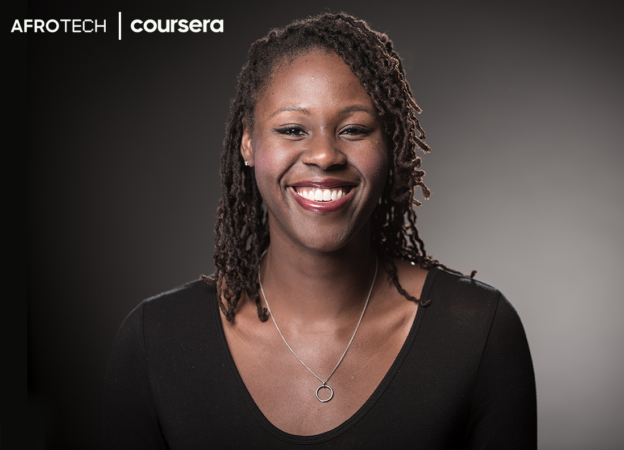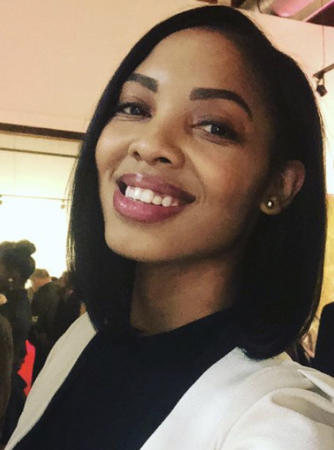Online education has truly been a game-changer for those looking to earn certificates or degrees at their own pace. Yet, affordability and tuition fees continue to be a barrier for many trying to achieve their academic goals. Looking to bridge the gap between access and affordability, Coursera has emerged as a cutting edge online learning platform that now offers everything from professional certificates to online masters degrees. Simply looking to pick up new skills? They’ve got you covered for that as well.
Founded in 2012 by Stanford University professors Andrew Ng and Daphne Koller, Coursera has become a haven for students and lifelong learners alike. Behind the scenes, partnerships with over 200 of the world’s best universities and companies have grown the platform’s global reach by giving learners access to a deep pool of academic and professional resources.
For Shantelle Williams-Valadié, connecting the dots on a global scale is something she was literally born to do. With parents of Bahamian and Nigerian descent, the Miami native learned to embrace the beauty of diversity at a young age; eventually becoming fluent in French and Spanish with a dash of conversational Italian. After studying at both Stanford University and Sciences Po Paris, Shantelle decided to spend more time abroad, where she would later develop financial models for infrastructure projects across Africa and Europe — unique skills that have proven to make her an invaluable asset in any room.
At Coursera, Shantelle’s specialty is identifying and fostering new educational opportunities that in turn enable the digital giant to provide high-quality education at a fraction of the cost of traditional options, including a Bachelor’s degree program that she brought to fruition.
Taking a break from a hectic schedule that includes supporting universities across the globe, Shantelle spoke with us recently about ways her background has helped shape her time at Coursera, how living abroad as a Black woman helped empower her, and how Coursera is shifting the online education narrative. Check out our exclusive interview below:
How did the decision to live abroad impact your journey?
Williams-Valadié: My time abroad really made me who I am today. I think that before I left the U.S. I saw myself solely as a Black woman, whereas overseas you can kind of reinvent yourself. You’re not only Black, you’re the “American singer,” or “the business strategist,” and that felt very liberating. I had a passion for languages, so moving abroad made a lot of sense to me. I wanted a different perspective — and I knew that I needed to leave the U.S. to find it. It truly made me appreciate complex identities more. And in the end, I became even more proud to be a Black woman.
What ways is Coursera assisting students and professionals in this “new normal”?
Williams-Valadié: As people, I think we’re all struggling to pivot and adjust. So, Coursera has leaned in to help people do that; we have long understood that in order for people to be competitive, they’re going to need to be learning throughout their lives. This may be the new normal for many people, but Coursera had already foreseen a shift to lifelong learning. It’s why over the last eight years, we’ve invested in technology that allows you to learn at your own pace and connects you with the right courses using data science.
What are the benefits of online courses versus a traditional on-campus experience?
Williams-Valadié: Of course there are some things that are irreplaceable, like having coffee with a friend on campus. There are experiences that can’t be recreated, but with online learning you get to build courses in a way that applies to a broader audience, and on top of that you’re able to reach more people at once.
There’s also the breadth of choice. When I was in undergrad, my only choice was basically to enroll in semester-long courses, whereas with Coursera you can dabble here and there or do a one- or two-hour project to really explore your interests. Lastly, there’s sometimes a disconnect between what you learn on campus in traditional programs and what employers are looking for. But on Coursera, we say ‘these university courses provide the skills you need to be employed’ or ‘the skills taught in this certificate on Coursera prepare you for these specific jobs.’
What’s the process for identifying and developing new university partnerships at Coursera?
Williams-Valadié: We are a mission-driven company, so we look to work with universities that want to emphasize skill development and career outcomes so they’re designing courses that are going to help learners transform their lives. And when learners come to Coursera, they are looking for world-class instruction; we work with partners to deliver that at scale.
How can Black professionals interested in tech get ahead?
Williams-Valadié: I don’t want us to think of Black employees in tech in one way, we’re not a monolith. But I also think that we need to see examples of Black people with different journeys into tech. I didn’t start in tech at all, my career started in diplomacy and then private sector consulting and I sort of made my way into tech, it wasn’t my original goal.
Another part of my identity is living as a Black woman for almost a decade abroad and spending my time speaking other languages. That’s just not something I saw as a possibility growing up, and it turns out that it has actually helped my career in tech. My takeaway message is that there’s not one path for Black people to get into tech and because we’re not a monolith, all of our different experiences are cool — even if they seem a little bit outside of the norm. In fact, they will actually help in our careers in tech later on.
What was your personal experience like initially breaking into tech?
Williams-Valadié: I found it to be very hard to break in, and what helped me the most was talking to people. I don’t know if I would call it networking, but just finding people in my community who knew someone who worked at a tech company, and who was willing to take just 20 minutes of their time to have a coffee with me and tell me what they did. I did that with countless, countless people; and with each of those conversations, I figured out what kind of work I did want to do and didn’t want to do. I figured out that not all tech companies are created the same, that who the founder and CEO is truly matters, and whether it is an early-stage or late-stage startup also really matters. Ultimately, through those conversations, I found out about jobs that were opening, even though that wasn’t my primary goal at the time, it was just to understand the industry. So I say talk, talk, talk to as many people as you can who are already in this sector.
This article was published in partnership with Coursera. To learn more about opportunities at Coursera, let their team know that you’re interested.
This piece was brought to you in partnership with Coursera.


